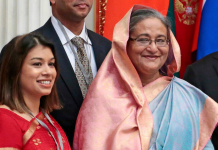NEW DELHI, JULY 10 (DNA): India’s Chief of Defence Staff (CDS) General Anil Chauhan has warned about a possible convergence of interests between China, Pakistan and Bangladesh, which as per him, could pose significant challenges to India’s internal stability.
“There is a possible convergence of interest we can talk about between China, Pakistan and Bangladesh that may have implications for India’s stability and security dynamics”, General Chauhan said while speaking at an event organised by the New Delhi-based think tank “Observer Research Foundation”.
The top Indian general’s remarks come against the backdrop of a diplomatic downturn in India-Bangladesh relations following the ouster of former Bangladeshi prime minister Sheikh Hasina last year, who later sought refuge in India.
Raising concerns on shifting geopolitical alignments in the Indian Ocean Region (IOR), Gen Chauhan claimed that the region’s economic vulnerabilities have enabled external actors to deepen their influence.
“IOR has allowed outside powers to leverage their influence through debt diplomacy, creating vulnerabilities for India. Similarly, frequent shifts in government in South Asia, with changing geopolitical equations and ideological views, pose another major challenge”, he said.
While he acknowledged speculation around China’s involvement, he noted: “It is challenging to determine the extent of state support provided by China to Pakistan during Operation Sindoor”, and added that no unusual activity was observed along India’s northern borders during the conflict.
The Indian chief of the defence staff, previously, while commenting on the recent Pakistan-India conflict, had become the first Indian official to admit that New Delhi lost an “unspecified number of fighter jets” in the May clashes.
His statement referred to the conflict that saw both countries using missiles, drones, and artillery fire during the four-day fighting in May — their worst in decades — triggered by an attack in April on Hindu tourists in Indian Illegally Occupied Jammu and Kashmir (IIOJK) that New Delhi blamed on Pakistan, an allegation denied by Islamabad.
During the brief conflict, Pakistan downed its six fighter jets, including three Rafales, and dozens of drones. After at least 87 hours, the war between the two nuclear-armed nations ended on May 10 with a ceasefire agreement brokered by the US.
Furthermore, the concern expressed by the top Indian general echoes the remarks made by Indian army’s deputy chief Lieutenant General Rahul Singh who last week claimed that China gave Islamabad “live inputs” on key Indian positions during the May clashes.

















